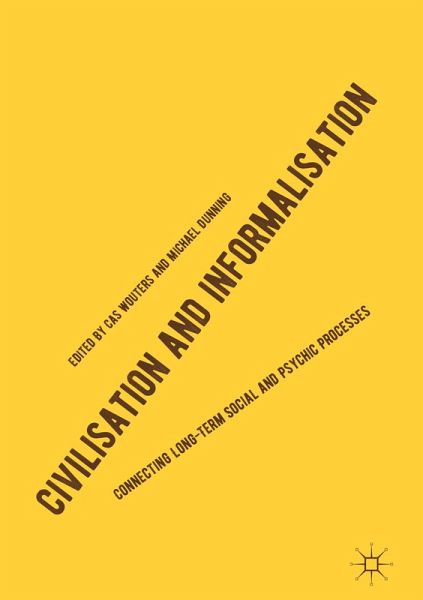
Civilisation and Informalisation (eBook, PDF)
Connecting Long-Term Social and Psychic Processes
Redaktion: Wouters, Cas; Dunning, Michael
Versandkostenfrei!
Sofort per Download lieferbar
104,95 €
inkl. MwSt.
Weitere Ausgaben:

PAYBACK Punkte
52 °P sammeln!
Over the last century and a half, manners and formalities in the West have become less status-ridden, stiff and rigid. Debates around Norbert Elias' theory of civilising processes gave rise to questions of a change in direction of these patterns. The concept of informalisation, which describes these transformations, was first used to analyse the tumultuous changes of the 1960s and 1970s. This increasing informality, leniency and flexibility, comes hand-in-hand with a growing demand on individuals to self-regulate their emotions.This book will stimulate debate around the changes in the standard...
Over the last century and a half, manners and formalities in the West have become less status-ridden, stiff and rigid. Debates around Norbert Elias' theory of civilising processes gave rise to questions of a change in direction of these patterns. The concept of informalisation, which describes these transformations, was first used to analyse the tumultuous changes of the 1960s and 1970s. This increasing informality, leniency and flexibility, comes hand-in-hand with a growing demand on individuals to self-regulate their emotions.
This book will stimulate debate around the changes in the standards of manners and emotion regulation, and will generate new avenues of enquiry that focus on issues involving informalisation. The chapters shed light on a variety of such moral and political issues over the last 150 years, offering a new and broader scope on the present social condition of humanity. Civilisation and Informalisation will be an important addition for students and scholars of figurational process sociology, and of broader interest to academics across sociology, social psychology and social history.
This book will stimulate debate around the changes in the standards of manners and emotion regulation, and will generate new avenues of enquiry that focus on issues involving informalisation. The chapters shed light on a variety of such moral and political issues over the last 150 years, offering a new and broader scope on the present social condition of humanity. Civilisation and Informalisation will be an important addition for students and scholars of figurational process sociology, and of broader interest to academics across sociology, social psychology and social history.
Dieser Download kann aus rechtlichen Gründen nur mit Rechnungsadresse in A, B, BG, CY, CZ, D, DK, EW, E, FIN, F, GR, HR, H, IRL, I, LT, L, LR, M, NL, PL, P, R, S, SLO, SK ausgeliefert werden.












